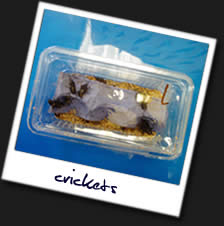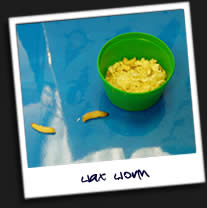www.reptiles-info.co.uk
Gecko Feeding:
Feeding geckos correctly is essential for maintaining a healthy active geck,o therefore we have provided a guide on what is best in order to provide a gecko with a healthy balanced diet.
Food Type:

The main food type that gecko's like to eat are insects these can range from crickets, locusts, silkworms, mealworms and wax worms all of which can help to maintain a varied healthy diet for your gecko. In my opinion it is best to use crickets as the main food source for your gecko as they provide a nutritional everyday meal and can be purchased fairly easily from your local pet shop. Crickets are also very versatile and offer movement that attracts the attention of the gecko. However I offer a warning that crickets can become very aggressive when hungry! Can even turn gn your gecko and cause injury by biting parts of your gecko if the crickets are left in the cage overnight. Therefore I suggest that if you are leaving crickets in the geckos housing overnight leave some grated apple in the cage for the crickets. The best advice is to only feed sufficient for your Leopard to eat within an hour or so and remove any surplus crickets. Leaving crickets in the vivarium for long periods can also reduce your Leopard Geckos hunting instinct and lead to him ignoring the prey items.

Another good source of nutritional food for your gecko is mealworms that can be left within a bowl in the geckos housing in order for the gecko to eat when feeling hungry. Caution! Mealworms have very tough skin and can be difficult to digest, make sure you feed a size small enough to be easily eaten by your Gecko. Baby Leopard Geckos should be fed with mini mealworms, not with the regular size. Geckos also like to feed on wax worms and these are seen by the gecko as an enjoyable meal this is because they are very fatty, it is advised that wax worms are used as a treat to the gecko as if it was fed on a daily basis this would cause health problems. The varied diet of a gecko helps to maintain their appetite and helps to prevent them from going off certain foods as there is a wide variety at their disposal. In order to promote your gecko to try a variety of food it is best to introduce new foods when the gecko is a juvenile as they are much more willing to try new food than an adult gecko. Food types to avoid feeding your gecko's is dried cricket products as the majority of people find that their gecko is not attracted to them as they do not move, unlike live food where the movement of the insect can attract the geckos attention.
Diet Supplements:
In order to add more nutrition to the diet of your gecko it is advised to 'load' the live crickets that you feed the geckos twenty-four hours prior to them being feed to a gecko. This means feeding them so that their gut is full which in turn ensures that the cricket is full of nutrients and will offer a much better meal to your gecko than if the cricket was placed straight into the cage without being fed. There are a variety of commercial cricket diets that are available, other suitable foods include fish food flakes and dried dog and cat foods. Offering your crickets orange segments adds vitamin C whilst providing moisture, otherwise place a jam jar lid with cotton wool soaked in water in the cricket tank (they will drown in an open water dish). Other ways to get nutrients into your gecko include 'dusting' the insects with a product such as repton or Nutrabol that contain vitamins and minerals, all of which help to create a balanced diet for your gecko. Dusting insects can be done by placing them into a bag and adding any vitamin/calcium products and then shake the bag, this should provide a coating over the insects ready to be placed into the gecko’s cage. Baby Leopard Geckos need a calcium supplement 2 – 3 times per week, adults only once. Important! Too much calcium can cause serious health problems – don’t over do it.
Food Size:
When feeding your gecko it is important to take into account the size of the insects you are placing into the reptiles housing. As a rule of thumb it is best to place insects no bigger than the width of the size of the geckos head as this helps to prevent choking and impaction that is caused when the food size being eaten is too big. Black crickets in particular are hard bodied and a small Leopard Gecko will end up running away from a large black cricket!
Feeding Times:
It is best to feed your adult reptile gecko every other day with a meal size that can be eaten by the gecko in fifteen minutes. Around 2-10 crickets can be eaten at each feed time. When feeding baby/juvenile gecko's it is best to feed them everyday ranging from 2-20 crickets depending on how hungry they are. If there is any left over insects it is best to remove them from the geckos housing.
Water:
Water is a very important factor in the diet of the gecko, a small dish of fresh water should be kept in the cage at all times that enables the gecko to drink from when they feel thirsty. The bowl should only be big enough to drink from and not be large enough so that a gecko can bathe in the dish. If you are using tap water it is best to filter the water or leave it to stand for twenty-four hours in order to remove all of the chemicals from the water.
Gecko Pages






